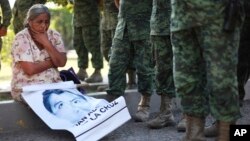Mexican and international human rights groups Monday told the families of 43 students missing since 2014 that they are not alone, just days after President Enrique Pena Nieto reaffirmed his belief in the government’s initial widely discredited investigation into the case.
Pena Nieto released a video last week in which he conceded that he would not be leaving a peaceful and safe country when his term ends later this year. But he said he remained convinced that the students from the teachers college in the southern state of Guerrero were killed by a drug gang and incinerated in a massive fire.
His assertion came nearly four years after the Sept. 26, 2014, incident in the town of Iguala. Since then, multiple reports by international investigators have criticized and discredited parts of the government’s original investigation.
‘Worrisome’ position
Jan Jarab, representative for the United Nations High Commissioner for Human Rights in Mexico, alluded to Pena Nieto’s comments Monday.
“There are signs that the authorities appear to be going back to the previous version,” Jarab said. He called it “worrisome” because independent experts had discredited key parts of it.
“The case of the Ayotzinapa 43 has not eclipsed the other cases of disappearances in Mexico as it could have four years ago,” Jarab said. “Rather it has highlighted the tragedy of disappearances that is lived in so many parts of the country and the lack of an adequate response by the state.”
Jarab called on incoming President Andres Manuel Lopez Obrador to use the critical outside investigations as a starting point to pick up the work of finding out what happened to the students and identifying those responsible.
Truth commission ordered
In June, a federal court ordered the government to create a truth commission to reinvestigate the case. Among the problems was the widespread use of torture to extract confessions, a problem highlighted by a U.N. report earlier this year and affirmed by the court. The government is appealing the court’s decision.
Jarab joined the Inter-American Commission on Human Rights monitoring team, which presented its own report to the families, and Mexico’s National Human Rights Commission at the Rural Normal School at Ayotzinapa near Tixtla, Guerrero on Monday.
Their rejection of Pena Nieto’s recent comments came the same day the outgoing president gave his final state of the union speech in Mexico City. Lopez Obrador will take office Dec. 1.
Luis Raul Gonzalez Perez, the head of Mexico’s National Human Rights Commission, said it continues working on its own report. He said the series of human rights violations they would identify in their report would be “exhaustive.”










